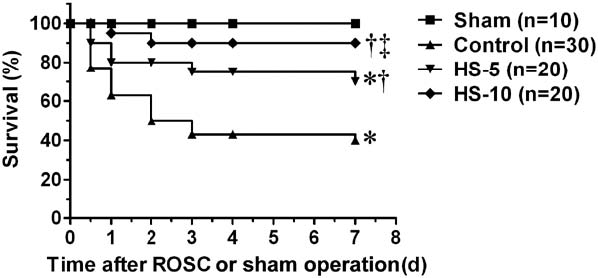博文
氢气或能帮助医生挽救患者生命
||
心脏骤停是造成人类死亡的重要原因之一,根据估计美国每年32.5万人因为心脏骤停死亡。虽然心肺复苏成功率能达到大约30-40%,但是只有2-12%的患者恢复良好出院。心脏骤停后心肺复苏的不理想预后让人沮丧,有75%的心肺复苏成功后的患者死亡或遗留永久性神经损伤。尽管低温治疗被临床研究证明有效,但并没有任何药物能提高心肺复苏成功后患者的预后。
大量基础与临床研究证明,氧化应激和炎症是心肺复苏后脑组织损伤和死亡发展过程的关键因素。最近几年,许多科学家发现氢气通过选择性抗氧化和抗炎症作用,对多种氧化损伤相关疾病具有很好的治疗效果。也有研究发现氢气生理盐水或氢水能减少多种器官损伤,包括大脑、西藏、肺和小肠的氧化损伤和炎症反应经氢治疗后明显缓解。氢气生理盐水是一种简单有效的给药方法,已经成为研究氢生物医学效应的常规方法。


最新一项研究发现,氢气生理盐水注射可作为提高动物心脏骤停后复苏预后的方法,该研究是中国第四军医大学西京医院熊利泽教授课题组完成,文章已经发表在《Anesthesia & Analgesia》上。研究采用大量研究数据证明,给动物每公斤体重注射5毫升或10毫升,能明显提高心脏骤停后复苏成功率和长期生存率,形态学研究发现经过治疗后动物脑组织损伤得到明显保护,反应动物脑功能的行为学指标明显改善,血脑屏障破坏的程度明显缓解,脑组织内抗氧化酶活性增强,组织氧化损伤指标明显下降,血液和脑内炎症反应因子也明显减少。研究结果提示,氢气生理盐水所以能提高动物心脏骤停后复苏成功率和长期生存率,可能是由于氢气对脑组织的氧化损伤和炎症反应具有对抗效应产生,保护了脑组织和血脑屏障被缺血导致的破坏。研究结果提示,使用氢气或者能挽救部分心脏骤停复苏后患者的生命,提高患者生活质量。
《麻醉与镇痛》是国际上享有盛誉的麻醉学专科综合型期刊杂志,是国际麻醉研究学会的官方杂志,创刊于1988年,发表麻醉学及相关学科文章,包括临床研究和实验研究。
全文阅读
Hydrogen-Rich Saline Improves Survival and Neurological Outcome after Cardiac Arrest and Cardiopulmonary Resuscitation in Rats.
Huo TT1, Zeng Y, Liu XN, Sun L, Han HZ, Chen HG, Lu ZH, Huang Y, Nie H, Dong HL, Xie KL, Xiong LZ.
BACKGROUND:
Sudden cardiac arrest is a leading cause of death worldwide. Three-fourths of cardiac arrest patients die before hospital discharge or experience significant neurological damage. Hydrogen-rich saline, a portable, easily administered, and safe means of delivering hydrogen gas, can exert organ-protective effects through regulating oxidative stress, inflammation, and apoptosis. We designed this study to investigate whether hydrogen-rich saline treatment could improve survival and neurological outcome after cardiac arrest and cardiopulmonary resuscitation, and the mechanism responsible for this effect.
METHODS:
Sprague-Dawley rats were subjected to 8 minutes of cardiac arrest by asphyxia. Different doses of hydrogen-rich saline or normal saline were administered IV at 1 minute before cardiopulmonary resuscitation, followed by injections at 6 and 12 hours after restoration of spontaneous circulation, respectively. We assessed survival, neurological outcome, oxidative stress, inflammation biomarkers, and apoptosis.
RESULTS:
Hydrogen-rich saline treatment dose dependently improved survival and neurological function after cardiac arrest/resuscitation. Moreover, hydrogen-rich saline treatment dose dependently ameliorated brain injury after cardiac arrest/resuscitation, which was characterized by the increase of survival neurons in hippocampus CA1, reduction of brain edema in cortex and hippocampus, preservation of blood-brain barrier integrity, as well as the decrease of serum S100β and neuron-specific enolase. Furthermore, we found that the beneficial effects of hydrogen-rich saline treatment were associated with decreased levels of oxidative products (8-iso-prostaglandin F2α and malondialdehyde) and inflammatory cytokines (tumor necrosis factor-α, interleukin-1β, and high-mobility group box protein 1), as well as the increased activity of antioxidant enzymes (superoxide dismutase and catalase) in serum and brain tissues. In addition, hydrogen-rich saline treatment reduced caspase-3 activity in cortex and hippocampus after cardiac arrest/resuscitation.
CONCLUSIONS:
Hydrogen-rich saline treatment improved survival and neurological outcome after cardiac arrest/resuscitation in rats, which was partially mediated by reducing oxidative stress, inflammation, and apoptosis.
https://blog.sciencenet.cn/blog-41174-804749.html
上一篇:世界是真实的吗?
下一篇:氢气治疗神经病理性疼痛